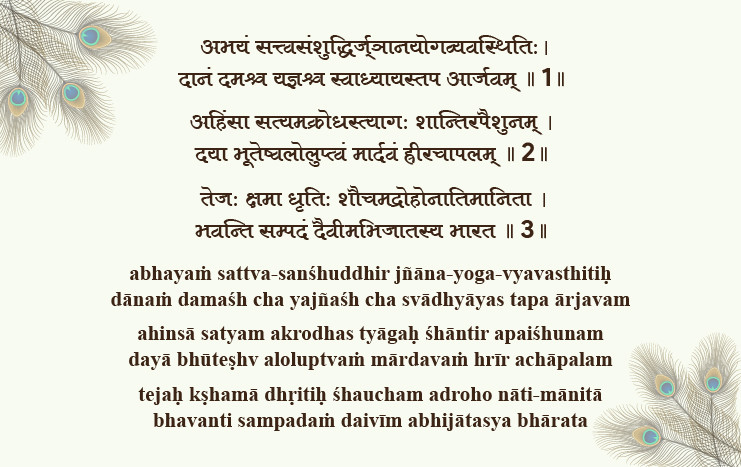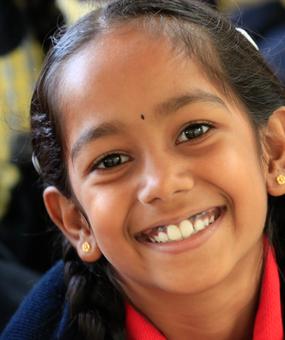I was four months pregnant the first time I read the Bhagavad Gita. I wondered why my mother-in-law insisted I read holy scriptures like Vedas, Ramayana, Puranas and Bhagavad Gita. Towards the end of Chapter 1, I knew I was doing the right thing at the right time.
Gurudev Sri Sri Ravi Shankar suggests reading the Bhagavad Gita at least once in a lifetime. It helps you dive deep into life’s secrets. All age groups can connect with the Gita as it reveals much about many aspects of life like human values, philosophy, psychology, motivation, management, leadership, and communication skills among many others.
Does the Gita say anything about parenting?
In this article, we focus on three shlokas from the Gita, their translations and takeaways for parents to inspire and guide their children the right way.
Bhagavad Gita shloka 62 of chapter 2

ध्यायतो विषयान्पुंस: सङ्गस्तेषूपजायते |
सङ्गात्सञ्जायते काम: कामात्क्रोधोऽभिजायते || 2.62||
dhyāyato viṣhayān puṁsaḥ saṅgas teṣhūpajāyate
saṅgāt sañjāyate kāmaḥ kāmāt krodho ’bhijāyate
Translation
The man dwelling on sense objects develops attachment for them; it springs up desire, and desire (unfulfilled) bursts into anger.
Takeaways for parents
It is natural for parents to love their children. But when love takes its form as an attachment, relationships suffocate.
A mother is in love with her baby much before its birth. The baby grows into a teen and gives more importance to his friends than the mother. This makes her feel dejected. She tries to pull him towards her resulting in suffocation in the relationship. Bhagavad Gita says about Mother Nature loves all, but She is not attached to anyone. In a similar vein, you may love your children but without any attachments. It will keep your relationships healthy. Otherwise, the atmosphere at home can often get heated up.
Meditation is the art of letting go of your desires, says Gurudev Sri Sri Ravi Shankar.
Know the powerful breathing techniques and wisdom that help manage anger at The Art of Living Online Meditation and Breath Workshop.
Learn More!
Bhagavad Gita shloka 5 of chapter 6
 उद्धरेदात्मनात्मानं नात्मानमवसादयेत् ।
उद्धरेदात्मनात्मानं नात्मानमवसादयेत् ।
आत्मैव ह्यात्मनो बन्धुरात्मैव रिपुरात्मनः ॥ 6.5॥
uddharedātmanātmānaṃ nātmānamavasādayet
ātmaiva hyātmano bandhurātmaiva ripurātmanaḥ
Translation
Uplift yourself through your efforts, and do not degrade yourself. For, the mind can be the friend and also the enemy of the Self.
Takeaways for parents
Research validates that the young child’s ability to imitate the actions of others is a mode of learning. They begin imitating the closest caregivers, their parents, in the initial stages of their life. The parents’ conduct plays a significant role in their children’s behavior formation. Children always observe their parents. They learn from not just what the parents speak but also from their conduct. Therefore, always say the right things and be gentle in your behavior.
This can only happen when you imbibe good qualities into your mind and make it your friend, or else, your mind may slip into bad habits and become your enemy. For instance, if parents have a bad habit of telling lies, kids may pick up on this. Your kids are watching you, so better make your mind a friend. This will help you present a good example to your kids, resulting in a happy environment at home. When you make your mind a good friend, kids will follow suit.
The world’s most effortless meditation program, Sahaj Samadhi Dhyana Yoga, brings your brain waves into a calming alpha-wave state that soothes your nervous system, providing deep relaxation to the body and mind.
Testimonial
Shagun Pant, Delhi, shares, “Sahaj transforms from ‘I have lost it!’ to ‘My mind is clear and in my control’ with ease.”
Know more about Sahaj Samadhi Dhyana Yoga
Bhagavad Gita shloka 1-3 of chapter 16

श्रीभगवानुवाच |
अभयं सत्त्वसंशुद्धिर्ज्ञानयोगव्यवस्थिति: |
दानं दमश्च यज्ञश्च स्वाध्यायस्तप आर्जवम् || 1||
अहिंसा सत्यमक्रोधस्त्याग: शान्तिरपैशुनम् |
दया भूतेष्वलोलुप्त्वं मार्दवं ह्रीरचापलम् || 2||
तेज: क्षमा धृति: शौचमद्रोहोनातिमानिता |
भवन्ति सम्पदं दैवीमभिजातस्य भारत || 3||
śhrī-bhagavān uvācha
abhayaṁ sattva-sanśhuddhir jñāna-yoga-vyavasthitiḥ
dānaṁ damaśh cha yajñaśh cha svādhyāyas tapa ārjavam
ahinsā satyam akrodhas tyāgaḥ śhāntir apaiśhunam
dayā bhūteṣhv aloluptvaṁ mārdavaṁ hrīr achāpalam
tejaḥ kṣhamā dhṛitiḥ śhaucham adroho nāti-mānitā
bhavanti sampadaṁ daivīm abhijātasya bhārata
Translation
Lord Krishna said: Purification of existence, cultivation of spiritual knowledge, charity, self-control, sacrifice, the study of the Vedas, austerity and simplicity; nonviolence, truthfulness, freedom from anger; renunciation, tranquility, aversion to mistakes, compassion and freedom from covetousness; gentleness, modesty and steady determination; vigor, forgiveness, fortitude, cleanliness, freedom from envy and the passion for these saintly virtues, O! son of Bharata, belong to godly men gifted with divine nature.
Takeaways for parents
Parents need to cultivate these human values as a part of their spiritual journey. These qualities go a long way in the character building of their own children. Children start reflecting on these virtues and will imbibe these qualities when they see their parents living them.
Conclusion
Just as Arjuna found a friendly and fatherly figure in Lord Krishna and implemented his teachings, you may implement the wisdom from these shlokas to improve your relationship with your children.
Based on inputs from Gurudev Sri Sri Ravi Shankar
Written by: Pratibha Sharma
Reference link
“When your mind becomes your enemy”, an insight by Gurudev Sri Sri Ravi Shankar on Bhagavad Gita.
Related links
Gita Gyan by Gurudev Sri Sri Ravi Shankar is a discourse on the Bhagavad Gita in Hindi.
The Signature Edition of Bhagavad Gita – by Gurudev Sri Sri Ravi Shankar. It is a talking book in 14 languages with guided meditations and bhajans.

Pratibha Sharma is a teacher-cum-author. She is passionate about giving words to inexpressible emotions, feelings, and experiences. She is a science graduate in biology and a management postgraduate who feels children and teens are her favorite subjects for interaction and learning. Report writing for UNICEF on “Genderism and Child Rights” is a feather in her cap.
















